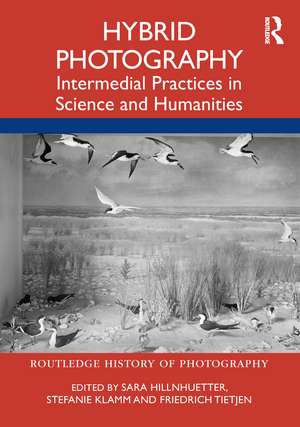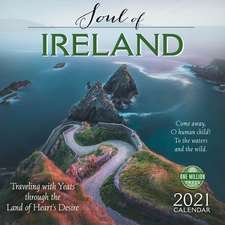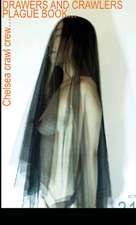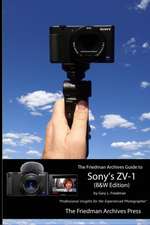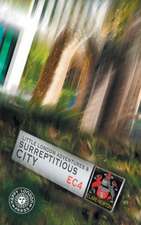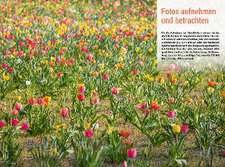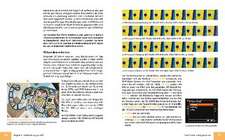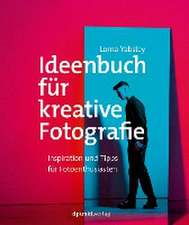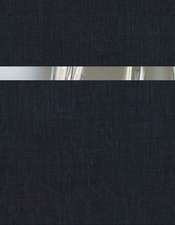Hybrid Photography: Intermedial Practices in Science and Humanities: Routledge History of Photography
Editat de Sara Hillnhuetter, Stefanie Klamm, Friedrich Tietjenen Limba Engleză Paperback – 26 aug 2024
It operates on the assumption that when photography was introduced, it did not oust other methods of image production but rather became part of ever more specialized and sophisticated technologies of representation. The epistemological break commonly set with the advent of photography since the nineteenth century has probably been triggered by photographic techniques but certainly owes much to the availability of a plethora of hybrid media—media that influence the relation of sciences, humanities, and their methods and subjects.
This book will be of interest to scholars in art and visual culture, photography, and history of photography.
| Toate formatele și edițiile | Preț | Express |
|---|---|---|
| Paperback (1) | 312.34 lei 3-5 săpt. | +25.99 lei 5-11 zile |
| Taylor & Francis – 26 aug 2024 | 312.34 lei 3-5 săpt. | +25.99 lei 5-11 zile |
| Hardback (1) | 603.80 lei 6-8 săpt. | |
| Taylor & Francis – 8 apr 2021 | 603.80 lei 6-8 săpt. |
Din seria Routledge History of Photography
-
 Preț: 311.37 lei
Preț: 311.37 lei - 9%
 Preț: 1037.99 lei
Preț: 1037.99 lei -
 Preț: 312.54 lei
Preț: 312.54 lei -
 Preț: 314.34 lei
Preț: 314.34 lei -
 Preț: 311.03 lei
Preț: 311.03 lei -
 Preț: 304.04 lei
Preț: 304.04 lei -
 Preț: 296.22 lei
Preț: 296.22 lei -
 Preț: 311.41 lei
Preț: 311.41 lei -
 Preț: 295.69 lei
Preț: 295.69 lei - 20%
 Preț: 259.51 lei
Preț: 259.51 lei - 19%
 Preț: 246.84 lei
Preț: 246.84 lei -
 Preț: 325.06 lei
Preț: 325.06 lei - 26%
 Preț: 850.73 lei
Preț: 850.73 lei - 16%
 Preț: 261.33 lei
Preț: 261.33 lei - 17%
 Preț: 259.90 lei
Preț: 259.90 lei - 15%
 Preț: 267.41 lei
Preț: 267.41 lei - 25%
 Preț: 766.49 lei
Preț: 766.49 lei - 16%
 Preț: 249.15 lei
Preț: 249.15 lei - 15%
 Preț: 258.97 lei
Preț: 258.97 lei - 16%
 Preț: 260.54 lei
Preț: 260.54 lei -
 Preț: 290.15 lei
Preț: 290.15 lei - 25%
 Preț: 713.72 lei
Preț: 713.72 lei - 30%
 Preț: 794.48 lei
Preț: 794.48 lei - 30%
 Preț: 776.19 lei
Preț: 776.19 lei -
 Preț: 326.56 lei
Preț: 326.56 lei - 17%
 Preț: 257.03 lei
Preț: 257.03 lei - 16%
 Preț: 260.16 lei
Preț: 260.16 lei -
 Preț: 326.26 lei
Preț: 326.26 lei - 18%
 Preț: 948.71 lei
Preț: 948.71 lei
Preț: 312.34 lei
Nou
Puncte Express: 469
Preț estimativ în valută:
59.77€ • 62.17$ • 49.35£
59.77€ • 62.17$ • 49.35£
Carte disponibilă
Livrare economică 24 martie-07 aprilie
Livrare express 08-14 martie pentru 35.98 lei
Preluare comenzi: 021 569.72.76
Specificații
ISBN-13: 9780367744441
ISBN-10: 0367744449
Pagini: 220
Ilustrații: 178
Dimensiuni: 174 x 246 x 15 mm
Greutate: 0.54 kg
Ediția:1
Editura: Taylor & Francis
Colecția Routledge
Seria Routledge History of Photography
Locul publicării:Oxford, United Kingdom
ISBN-10: 0367744449
Pagini: 220
Ilustrații: 178
Dimensiuni: 174 x 246 x 15 mm
Greutate: 0.54 kg
Ediția:1
Editura: Taylor & Francis
Colecția Routledge
Seria Routledge History of Photography
Locul publicării:Oxford, United Kingdom
Public țintă
AcademicCuprins
Introduction: Where Does Photography Start? And Where Does it End? A Hybrid Introduction
Sara Hillnhuetter, Stefanie Klamm, Friedrich Tietjen
Part 1: Hybrid Measurement
Sara Hillnhetter1. Hybrid Photography in the History of Science: The Case of Astronomical Practice
Omar W. Nasim
2. The Map as a Photograph: Theodor Scheimpflug’s Balloon Aerial Photogrammetry
Michael Kempf
3. Seen from Above: Wilhelm Halffter’s Photographs of 1854, Depicting the Terrain Models of Hermann and Adolph Schlagintweit
Sigrid Schulze
4. In Order of Disappearance: Photography, Measurement and Art Historical Practice in Nineteenth-Century German
Sara Hillnhetter
Part 2: Hybrid Materiality
Stefanie Klamm
5. “Imageability”: Aligning Bodies and Imaging Technologies
Kathrin Friedrich
6. Beyond Retouching: Hans Virchow’s Mixed Media and His X-ray Drawings of the Lotus Foot
Vera Dünkel
7. From Photography to Printing: the Chronophotography of Étienne-Jules Marey
Linda Bertelli
8. Entangled Environments: Diorama, Photography, and the Staging of Natural Surroundings
Alexander Streitberger
9. Reconfiguring the Use of Photography in Archaeology
Stefanie Klamm
Part 3: Hybrid Reproduction
Friedrich Tietjen10. “The Camera That Takes a Face, Can Take a Page”: Microfilm as a Scientific Aid
Estelle Blaschke
11. Stereo Atlases as Hybrid Knowledge
Kelley Wilder
12. Retouching, Staging, and Authenticity: Early Animal Photography and the Tradition of Popular Zoological Illustration around 1900
Alexander Gall
13. “Offering Pleasures to the Eye.” Max Semrau’s Kunst des Altertums (1899), Its Illustrations, and Art History’s Ignorance Towards Reproduction
Friedrich Tietjen
14. Fantasy of a World Without Humans
Jimena Canales
Sara Hillnhuetter, Stefanie Klamm, Friedrich Tietjen
Part 1: Hybrid Measurement
Sara Hillnhetter1. Hybrid Photography in the History of Science: The Case of Astronomical Practice
Omar W. Nasim
2. The Map as a Photograph: Theodor Scheimpflug’s Balloon Aerial Photogrammetry
Michael Kempf
3. Seen from Above: Wilhelm Halffter’s Photographs of 1854, Depicting the Terrain Models of Hermann and Adolph Schlagintweit
Sigrid Schulze
4. In Order of Disappearance: Photography, Measurement and Art Historical Practice in Nineteenth-Century German
Sara Hillnhetter
Part 2: Hybrid Materiality
Stefanie Klamm
5. “Imageability”: Aligning Bodies and Imaging Technologies
Kathrin Friedrich
6. Beyond Retouching: Hans Virchow’s Mixed Media and His X-ray Drawings of the Lotus Foot
Vera Dünkel
7. From Photography to Printing: the Chronophotography of Étienne-Jules Marey
Linda Bertelli
8. Entangled Environments: Diorama, Photography, and the Staging of Natural Surroundings
Alexander Streitberger
9. Reconfiguring the Use of Photography in Archaeology
Stefanie Klamm
Part 3: Hybrid Reproduction
Friedrich Tietjen10. “The Camera That Takes a Face, Can Take a Page”: Microfilm as a Scientific Aid
Estelle Blaschke
11. Stereo Atlases as Hybrid Knowledge
Kelley Wilder
12. Retouching, Staging, and Authenticity: Early Animal Photography and the Tradition of Popular Zoological Illustration around 1900
Alexander Gall
13. “Offering Pleasures to the Eye.” Max Semrau’s Kunst des Altertums (1899), Its Illustrations, and Art History’s Ignorance Towards Reproduction
Friedrich Tietjen
14. Fantasy of a World Without Humans
Jimena Canales
Notă biografică
Sara Hillnhuetter is a research associate in the LOEWE cluster "Architectures of Order" at the Goethe University Frankfurt.
Stefanie Klamm is a research associate at Gotha Research Centre, University of Erfurt.
Friedrich Tietjen works as a researcher and curator and is one of the founders and co-organizers of the annual conference "After Post-Photography" in St. Petersburg, Russia.
Stefanie Klamm is a research associate at Gotha Research Centre, University of Erfurt.
Friedrich Tietjen works as a researcher and curator and is one of the founders and co-organizers of the annual conference "After Post-Photography" in St. Petersburg, Russia.
Descriere
This book explores the territories where manual, graphic, photographic, and digital techniques interfere and interlace in sciences and humanities.
